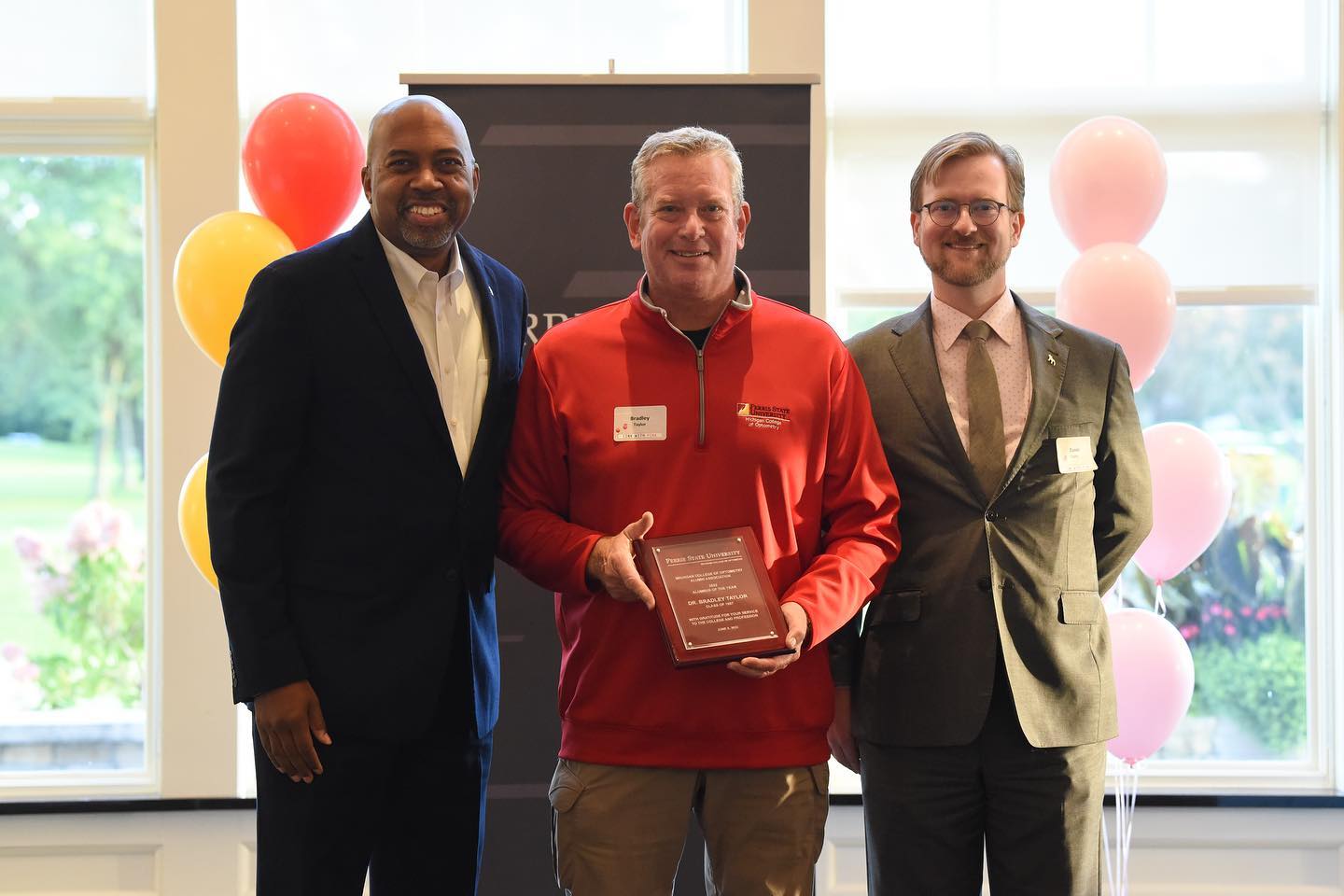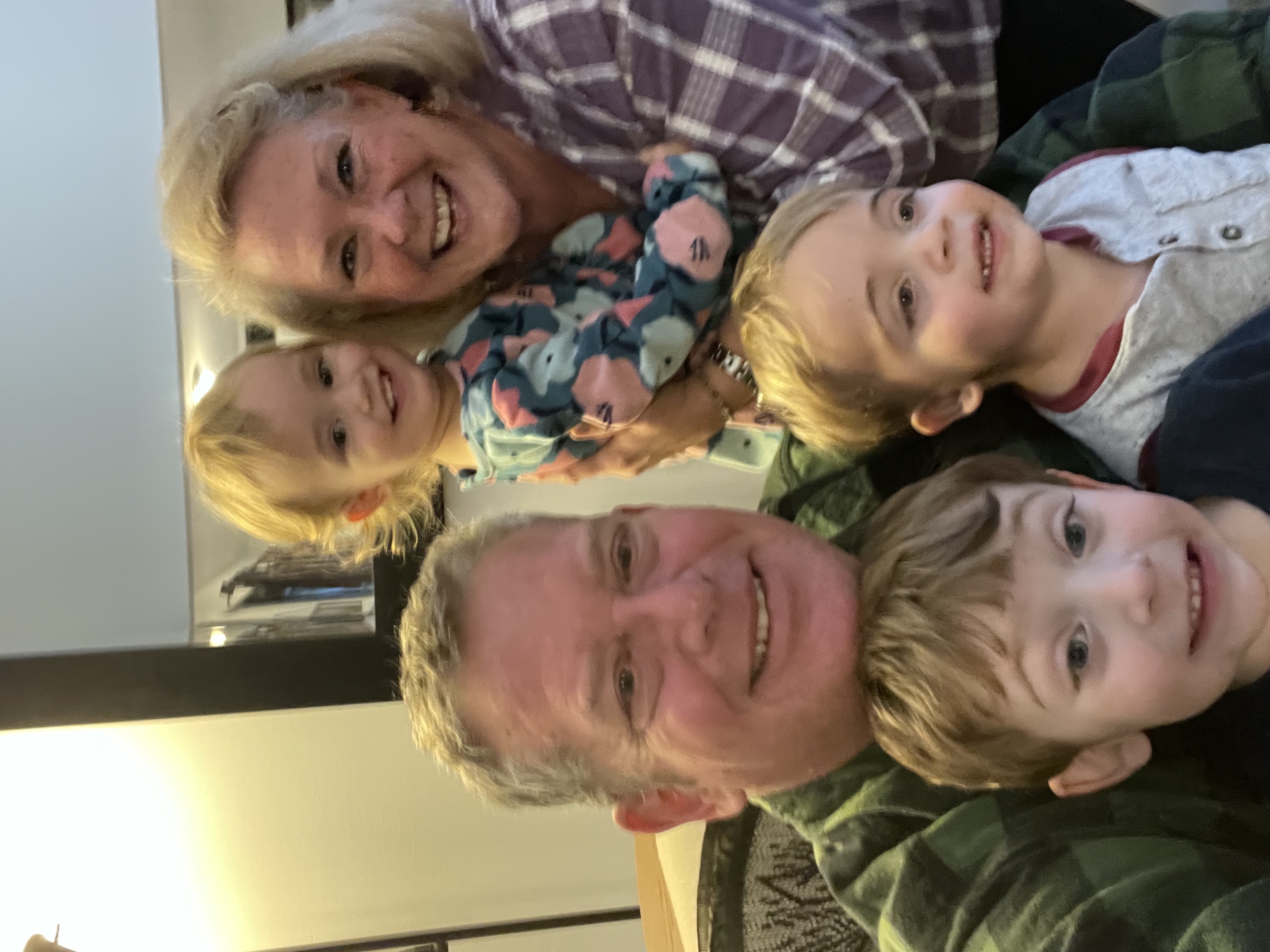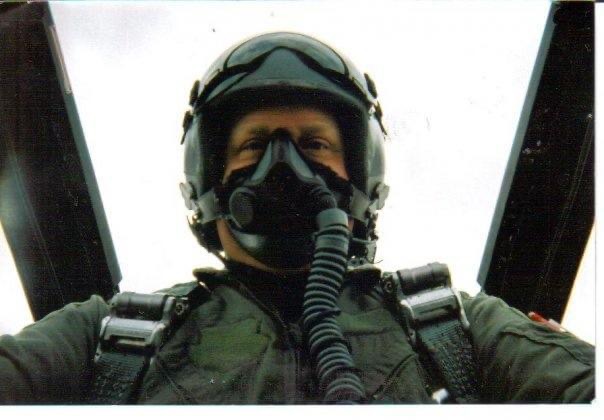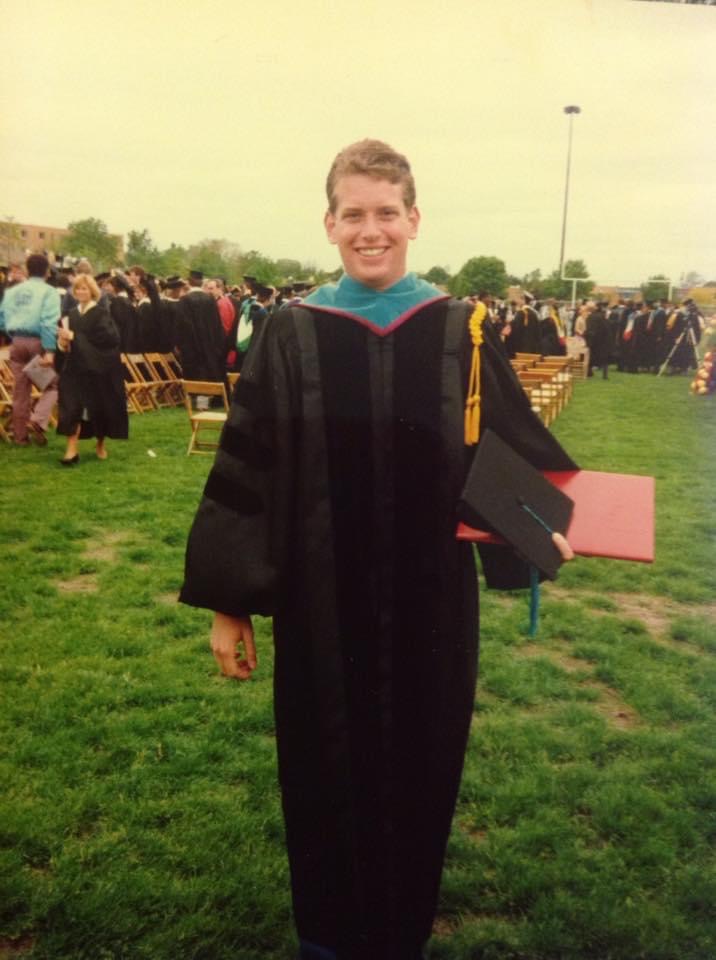Meet Alumnus of the Year 2022, Dr. Bradley Taylor
Tell me about your career? Where did it start and where did it take you?

MCO Alumnus of the Year 2022 Dr. Bradley Taylor received his award plaque from FSU
President Dr. Bill Pink and MCO Dean Daniel Taylor .
Looking back, I always look for new challenges as they are opportunities, always looking to better myself. Residencies were rare when I graduated optometry schools, I knew I still had a lot to learn. I was fortunate to start off in a practice in Michigan, now known as Specialty Eyecare. When I started, there were 3 ophthalmologists and 2 optometrists and the doctors at that practice had a pro-optometry approach. They felt that optometrists and ophthalmologist can work together for the betterment of patient care. So, I started off my career learning a lot about surgery and surgical patients which at the time I didn’t get much exposure to that in optometry school. After that, I got into private practice in Manchester, Michigan. That experience taught me how difficult it is to be in private practice and people who succeed in that have my utmost respect. Being a great optometrist is only a part of a successful practice, the business savvy part plays a huge role. It didn’t take me long to realize that wasn’t the path for me.
At that same time, I also had an opportunity to go back to school at University of Michigan at their School of Public Health and pursue a Master of Public Health degree. I became good at evaluating studies and epidemiology. Getting that degree has opened a lot of doors for me. I was fortunate that an optometrist who graduated a year behind me wanted the private practice, and I was able to turn the practice over to her where she's still running it with her daughter. After getting my Master’s in Public Health, teaching became another opportunity for me. I took a faculty position at Southern College of Optometry and taught the Public Health course. Because I had a strong background in post operative care and refractive surgery, I spent a majority of my clinic time in the primary care and ocular disease clinics. It was a tremendous learning experience. The students are pretty smart and trying to keep one step ahead of the students was a big learning experience. It was a tremendous learning experience for me.
Did you enjoy teaching in a classroom? How about clinical instruction?
I enjoyed both but my favorite was clinical instruction. It was a little different when I was at MCO. You showed up for class. I was class president and I had to make sure that no one was skipping classes because even if one student did, the instructors would notice.

At SCO, they had note-takers and the bigger school experience where maybe a third of the class would show up.
How long did you teach SCO?
I was there for six years, between 1994 to 2000.
Did you have to relocate your family?
Yes, my wife and three daughters. At the time, they were the only three grandkids on either side of the family and the grandparents weren't really happy. You know, family is a big part of life. I was one of the few students at the time that actually had a child when we were in optometry school. It really taught me responsibility.
How did you get into the Air Force?

Quite of few of SCO faculty worked outside of the school to supplement their salary. The head of the primary care department at the time had a patient that he knew that was in the Air National Guard and they were looking for an optometrist. Serving as a military optometrist was a tremendous opportunity. I was commissioned as an officer in the United States Air Force in 1996 and completed Officer Training School at Maxwell Air Force Base shortly after. I retired in 2020 as a Lieutenant Colonel.
Did you have to move a lot for your work?
I was assigned to the 164th Medical Group, Tennessee Air National Guard. I did travel quite a bit and provided eye care to military personnel in Hawaii, Australia, Alaska, Florida, Arizona, South Carolina and Germany.
When did you decide to move back to Michigan?
In January of 2001, I accepted a position at Kellogg Eye Center at the University of Michigan. At the time, I was one of three Optometrists on faculty. When I started, the entire Ophthalmology Department numbered about 90 people. When I left in 2018, there were over 600! During this time I was still traveling to Tennessee at least once a month for my National Guard duty. After 9/11, I was activated for 17 months providing care for airman heading over and returning from overseas duty.
How was the teaching experience different?
I was associated with the cornea clinic mainly seeing primary care and contacts. The emphasis there was the opposite of Southern College of Optometry, which was educating optometrists. At the University of Michigan and Kellogg Eye Center I was educating ophthalmology residents. It was different. The residents wanted to be in surgery and such. Fitting keratoconus patients was not what they were interested in doing and they knew they weren't going to be doing it in their professional career,
Were the patient cases more challenging at Kellogg Eye center?
Certainly, they were more challenging! The fact that for a lot of these patients, you were kind of the end of the road, meaning that they had already had their corneal transplant or cataract surgery. They were a surgical success, but they still couldn't see very well it was up to you to help them. New technologies were coming out, like scleral lenses, which revolutionized how we could treat a lot of these interesting corneas.
How did you decide which technologies were worth embracing?
First of all, you have to weed out some stuff. There's always new technologies, but is it going to be better for my patients? For example, there has been a lot of dry eye technologies and none of this equipment is cheap. You have to weigh the business and professional side! Can I make money off of this service? But also, is this offering a better service for my patients?
You never stop learning. Whether its online or going to meetings or talking to people that you know. Also, keeping in contact with your professors is a good idea. Use them as a resource throughout your career.
Did you enjoy the interdisciplinary setting at Kellogg Eye Center?
Absolutely. It’s enjoyable to see what others can offer and how optometrists can be a member of the team and even opticians. I always say, you can be the best surgeon in the world, but if your patients’ glasses slide down their nose, they're going to say they can’t see! It’s a total package here. There's always going to be more people involved in the story than just you. That was a big point I tried to push to all the ophthalmology residents.
What made you decide to move to Northern Michigan after retiring from Kellogg?
The big thing was my wife and I had purchased a place in northern Michigan, and we were tired of living in the Ann Arbor area. I had a few more years left with the National Guard, and I was able to spend a lot more time with them. Another opportunity was offered to me to go to Air War College, which is a professional school for Air Force officers. Most of the coursework was online. Classes covered topics such as leadership, strategic planning, data analysis and critical thinking. It was very enjoyable. Air War College involved a lot of reading and writing, which I hadn’t done in a long time. It allowed me to get “outside” of the medical aspect of the Air Force and more into strategic, tactical and operational planning of the Air Force. All throughout my career, I've been able to surround myself with people a lot smarter than me and just hope that some of it rubs off. I retired from the Air Force in 2020.
How did you end up at the Saginaw VA?
There was an opportunity to be the supervisor of the Optometry Clinic. It involved both clinical and administrative duties. I work with five other O.D.’s, all who are MCO grads. I get to help out veterans, and we have a big blind rehab service, so visually impaired veterans get great care there. It's also been a lot of administrative work. I have the experience to figure out what does and doesn't work when it comes to procuring equipment or hiring people and such. So, I've tried to use that to help the clinic out to make it a good experience for veterans and also make it good for the people that work there.
Which mode of practice do you miss the most?
Honestly, the one I miss the most is probably my time at National Guard. It was just great people with a common mission. And for the most part, everybody was always on board to achieve goals. But I've never regretted anything, and I always look back. I'm the glass half full guy. They were great experiences- all of them. And at each one of them I knew exactly when it was time to move on to the next one. My advice, always look ahead to see what else is out there.

Any advice for graduating students?
First and foremost, you want to live in a place where you're happy. Your mental wellness is very important. Second of all, your first position (and I think this is true for a lot of my classmates) is not necessarily your last one, whether it's corporate, ophthalmology, residencies, whatever, explore them all, and keep exploring. Again, don't ever feel like you're stuck or that you can't change it, because you can. Last but not least, always go with a position where you think you can grow both as a person and as an optometrist. Because I think there's nothing worse than thinking that you're in a rut or dread going into work.
Did you have mentors throughout your career?
I definitely kept in contact with a lot of my professors from MCO and most of my classmates. The class of '87 was pretty close and we remain so, a large group of us talk on a regular basis in a group chat.
What does this award mean to you being Alumnus of the Year?
It's always nice to be recognized and you look at the previous winners and you realize it’s a pretty good crowd to be in and it is somewhat humbling in the fact that that there's other great candidates out there. MCO is small, but it was like family. In my class, we went to class together, we studied together, we partied together. I saw my classmates more than anybody else. People that didn't want to join, we just went and partied at their house. MCO has always been very near and dear to me. I spent seven years at Ferris State, and I mean the best seven years. We had great faculty, a lot of the faculty that I had were the original faculty, and so they were having to prove themselves, because it was still fairly new. They were hammering us to be good students and doctors. MCO means a lot to me personally. I enjoy doing what I can do to help our MCO students and hope to do more in the future. I always encourage all MCO alumni to continue to support their school!

